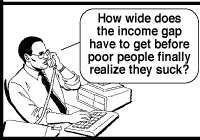The health care system is in swell shape, and besides, isn't doing nothing always better than doing anything anyway?
"There is no health care crisis, and doing no harm is far preferable to doing real damage to a good health care system."
~
Subscribe to:
Post Comments (Atom)
























9 comments:
Kristol is not only right on this, he is obviously right. And claiming that he is wrong about it just devalues the claim that he is 'always wrong'. We say he is 'always wrong' about substantive matters in dispute, not that he is 'always wrong' in how he uses common English words.
Crisis. noun.
1. a. A crucial or decisive point or situation; a turning point.
b. An unstable condition, as in political, social, or economic affairs, involving an impending abrupt or decisive change.
2. A sudden change in the course of a disease or fever, toward either improvement or deterioration.
3. An emotionally stressful event or traumatic change in a person's life.
4. A point in a story or drama when a conflict reaches its highest tension and must be resolved.
The only possible definition that fits is #4, and it is only the political tension that is at its highest point. Politicians have deliberately tried to increase the tension because that is the only way to get bills through -- and I'm not criticizing them for that, just pointing out that it is not 'the health care system' itself that is in a crisis mode.
Er, I need to clarify that. #1b is the one that could fit, not #4. Same general logic, though - the 'unstable condition' is exclusively political.
I don't know how to measure the kind of tipping point that definition describes, or how to know which statistic out of all the health care numbers available is the right one to watch. Here are two candidates:
A recent study found that 62 percent of all bankruptcies filed in 2007 were linked to medical expenses. Of those who filed for bankruptcy, nearly 80 percent had health insurance.
According to another published article, about 1.5 million families lose their homes to foreclosure every year due to unaffordable medical costs.
Those are pre-"recession" numbers.
Dang, I thought I had the link embedded in there...
http://www.nchc.org/facts/cost.shtml
You cite a lobbying group? Seriously?
http://www.pnhp.org/new_bankruptcy_study/Bankruptcy-2009.pdf
http://papers.ssrn.com/sol3/papers.cfm?abstract_id=1416947
OK, so medical costs are causing bankruptcies. But are there more bankruptcies than before? More per capita? Are the number of bankruptcies what we would consider a problem?
I'm guessing here, and perhaps the doctor might be able to help, but a whole bunch of people who are going bankrupt now would probably be dying or dead if this were 1981 because we can do stuff now to save people that we couldn't then.
Kristol is wrong in the sense that he says because there is no crisis, we should do nothing. It's like a dam wall, or maybe the levies in New Orleans. There are a few cracks showing, that in itself wouldn't be a crisis. But should we do nothing, wait till they're much bigger to do something about it? I would argue we should take care of the cracks while they are small, either by patching them, or saving up for the big fix when it is needed. Doing nothing is what leads to the crisis.
Is health care in a crisis? For some people - absolutely. For the country in genreal - probably not. It doesn't mean we can't be forward looking when we notice certain trends in what we spend money on. Politicians are bad at that, so as Briggs says, they have to manufacture a crisis in order to get things done.
What you say about Congress is certainly true. But how close to the edge of the waterfall do we need to get to call it a crisis? Medicare's Hospital Insurance trust fund runs out of money in 2017. "Its cost growth can be contained without sacrificing quality of care only if health care cost growth more generally is contained." http://www.ssa.gov/OACT/TRSUM/tr09summary.pdf. "The federal budget is on an unsustainable path, primarily because of the rising cost of health care." http://www.cbo.gov/publications/collections/health.cfm
Post a Comment